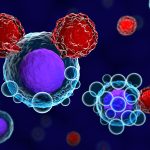-
Results That Matter
Cancer medications granted accelerated approval are often confirmed despite not demonstrating a benefit in overall survival or quality of life.
by Eric Fitzsimmons
-
April 5: The Week in Cancer News
More cancer patients are enrolling in clinical trials, and sentinel node biopsies alone may be adequate for some early-stage breast cancers.
by Marci A. Landsmann
-
Genetic Testing for Women With Breast Cancer
New recommendations clarify when women diagnosed with breast cancer should be offered genetic testing for inherited cancer risk.
by Laura Gesualdi-Gilmore
-
March 29: The Week in Cancer News
Survival rates have increased for older AML patients who receive stem cell transplants, and cervical cancer diagnoses rise among women living in low-income counties.
by Kevin McLaughlin
-
TIL Therapy Amplifies the Immune System’s Attack on Melanoma
The recently approved immunotherapy Amtagvi uses a patient’s own immune cells to destroy advanced melanoma.
by Sandra Gordon
-
March 22: The Week in Cancer News
First CAR T-cell therapy approval in chronic lymphocytic leukemia, and Environmental Protection Agency announces a complete ban on asbestos use in manufacturing.
by Thomas Celona
-
Dealing With Immediate Medical Test Results
Patients have been entitled to immediate access to medical records and test results for three years as a result of the Cures Act. It has changed how patients and doctors share information.
by Taneia Surles
-
March 15: The Week in Cancer News
Modified CAR T-cell therapy shows promise in glioblastoma, and an immunotherapy may soon be available as an injection.
by Eric Fitzsimmons
-
Empowering Pediatric Cancer Patients
After twice being treated for leukemia as a child, Brady Lucas discusses the mental impact of pediatric cancer.
by Suzanne McBride
-
March 8: The Week in Cancer News
Why do many Asian American women who have never smoked have lung cancer, and a report finds acne products can create cancer-causing benzine.
by Marci A. Landsmann
Cancer Talk
Treatment Combination Improves Survival in EGFR-positive Lung Cancer
Adding chemotherapy to targeted therapy improves outcomes for people with advanced EGFR-positive non-small cell lung cancer.
by Sandra Gordon
Lessons From 20 Years Living With CancerMultiple myeloma survivor Jonathan Gluck reflects on uncertainty, and the scientific progress that has kept him living with cancer for more than two decades.
by Eric Fitzsimmons
The Enduring Importance of Cancer Disparities ResearchOpening session from AACR conference highlights how perseverance and adversity have informed cancer disparities research over the years.
by Eric Fitzsimmons
Most Cancer Survivors Don’t Meet Healthy Diet GoalsDespite research linking fruits and vegetables to cancer survival, many people do not change their eating habits after diagnosis.
by Darlene Dobkowski














